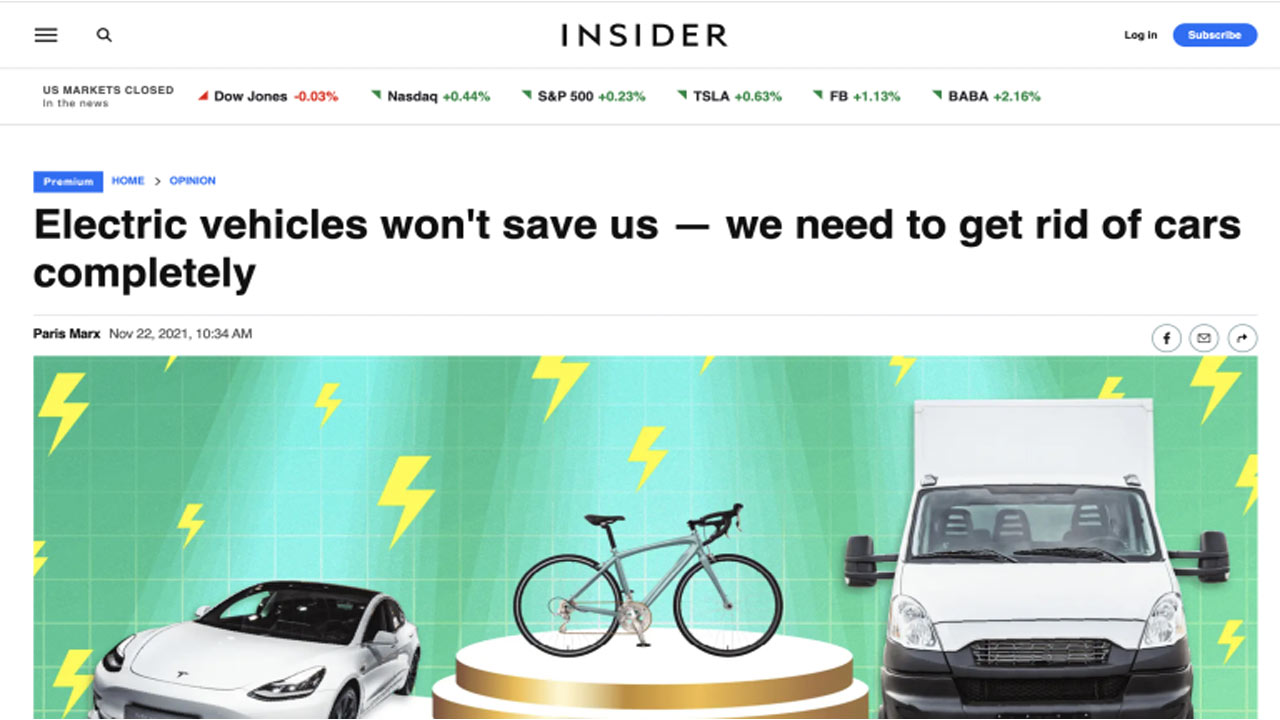
Paris Marx wrote in Business Insider: “Making transit available within a 10-minute walk of people’s homes would not only encourage its use and create tens of millions of jobs but could begin to transform our relationship to mobility. … There was a moment during the pandemic where it felt that change was not only possible but was happening in front of our very eyes. Streets were closed to vehicles so people had space to move, and temporary bike lanes were thrown up to encourage cycling. …
We should seize this opportunity to challenge the past century of auto-oriented planning and emphasize walking, cycling, and transit use over driving. Not only would people’s quality of life improve, but if we’re serious about taking on the climate crisis, we need to significantly reduce the number of cars and SUVs on the road — regardless of what powers them.”
#
You Were Warned!
“We might not own our own cars.”
UK funded 2019 report ‘Absolute Zero’ urged climate lockdowns: ‘Stop flying…no new roads, airport closures…stop eating beef & lamb…stop doing anything that causes emissions’ – Regulate CO2 similar to ‘asbestos’Climate lockdown: ‘It’s Time To Ban The Sale Of Pickup Trucks’ – ‘Shift away from relying on private vehicles entirely’
By Marc Morano | Climate Depot
https://www.businessinsider.com/electric-vehicles-wont-save-us-get-rid-of-cars-2021-11 VIA Business Insider: By Paris Marx, Nov 22, 2021, Electrifying heavy cars like trucks and SUVs cause other issues like air pollution and traffic deaths. Excerpts:
- World leaders are focusing on electric vehicles to reduce emissions and combat the climate crisis.
- But electrifying vehicles is simply not enough — especially given their large production footprint.
- To really make a difference, we need smaller cars, fewer cars, and more transportation alternatives.
- Paris Marx is the host of the Tech Won’t Save Us podcast and author of the forthcoming book, Road to Nowhere, about the problems with Silicon Valley’s future of transportation.
…
Transportation accounts for 29% of greenhouse gas emissions in the United States, and more than half of that comes from passenger vehicles. Since taking office in January, the Biden administration has taken steps toward electrification but also failed to sign onto a pledge announced at COP26 to phase out fossil-fuel vehicles by 2040.
Electric vehicles are one piece of a strategy to slash transport emissions, but they tend to receive far more attention than proposals to cut car use. The electrification of transportation is essential — there is no doubt about that — but just replacing every personal vehicle with a battery-powered equivalent will produce an environmental disaster of its own. Such a strategy also denies us the opportunity to rethink a near-century of misguided auto-oriented city planning.
…
While fuel economy standards have improved over time, the shift from sedans to SUVs and trucks has partially offset the emissions reductions that should have accompanied those improvements. Plus, when you look at the global picture, SUV sales have also taken off to such a degree that they were the second-largest contributor to the increase in global emissions from 2010 to 2018. The commonly stated solution to this problem is not to address the growing size of vehicles or the mass ownership of personal vehicles of any kind, but simply to electrify them. That isn’t good enough.
…
Ahead of COP26, the International Energy Agency released its latest World Energy Outlook that estimated achieving net-zero emissions by 2050 will require six times more minerals by mid-century than is necessary today. Yet the majority of those minerals are required for electric vehicles and storage, whose mineral demand is projected to increase by “well over 50 times by 2050” as the demand for batteries to power them grows substantially. As a result, the United States is assessing its own mineral supply chains and working with Canada to expand mining activities to supply battery makers. But all that mining comes with consequences.
…
As leaders at COP26 were focused on electric vehicles, a network of mayors and the International Transport Workers’ Federation released a report arguing that public transit use needs to double by 2030 in order to meet emissions targets. Making transit available within a 10-minute walk of people’s homes would not only encourage its use and create tens of millions of jobs but could begin to transform our relationship to mobility.
There was a moment during the pandemic where it felt that change was not only possible but was happening in front of our very eyes. Streets were closed to vehicles so people had space to move, and temporary bike lanes were thrown up to encourage cycling. In some cities, those efforts were expanded as the worst of the pandemic lifted so people could leave their cars at home and commit to using bikes or transit. But in other cities, the push to go “back to normal” swept away those spaces, and the SUVs returned.
We should seize this opportunity to challenge the past century of auto-oriented planning and emphasize walking, cycling, and transit use over driving. Not only would people’s quality of life improve, but if we’re serious about taking on the climate crisis, we need to significantly reduce the number of cars and SUVs on the road — regardless of what powers them.
…
Full article here: https://www.businessinsider.com/electric-vehicles-wont-save-us-get-rid-of-cars-2021-11
Related posts:
Views: 0
 RSS Feed
RSS Feed

















 December 1st, 2021
December 1st, 2021  Awake Goy
Awake Goy  Posted in
Posted in  Tags:
Tags: 
















